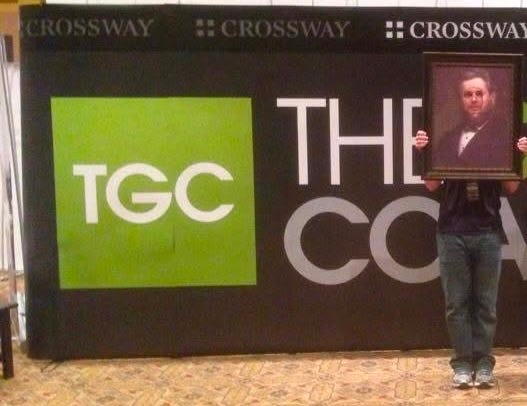No, You Won't See Me at the Conference.
Deep sadness and gratitude mingled together. Call it saditude?
I owe so much to The Gospel Coalition (TGC).
I came to saving faith in 2010 when I was 23 years old. Within about 18 months, I had become “Reformed” in my theology, although I barely knew what that meant. I was raised in the Reformed faith through my seminary education at Reformed Theological Seminary and the ministry of TGC.
While working in software development, I spent most of my breaks during the workday in my cubicle reading the latest TGC articles. I stayed up most nights reading the books I had ordered that were referenced in those same articles.
Soon, I started my own blog. I wrote several essays each week. At my worst, I wanted to imitate the ministry leaders I admired. At my best, I was inspired to grow in my ministry gifts. When I asked my wife about pursuing doctoral studies a few years ago, she replied, “Well, you already assign yourself essays to write. You might as well get some credit for it.” I owe my passion for writing to TGC’s influence on my life.
Attending TGC’s conference in Orlando in 2013 was a dream come true. I proudly had my picture taken in the Charles Spurgeon portrait frame (as one does at these things). I was energized by the sheer presence of like-minded believers in one place who were discussing the same topics I was passionate about.
And the books! Oh, the books!
I brought an extra suitcase just for the books when I returned to the TGC conference in 2015. I did the same at the Together for the Gospel conferences (T4G) in Louisville in 2014 and 2016.
I loved attending these conferences. It wasn’t just the content or the worship. Looking back now, I can see that the sense of belonging brought me the most joy. There is nothing like sitting in a room packed with thousands of people with whom you feel a sense of shared connection and purpose. After so much turmoil and trauma in my life, I had finally found my people.
The impact of TGC on my life is incalculable. I know I am a better Christian, pastor, husband, and friend because of TGC.
I missed the 2017 TGC conference, but I returned in 2019. By then, TGC had moved its conferences from Orlando to Indianapolis. Although I missed the sunshine of Orlando, to my surprise, I fell in love with Indianapolis. I rode a scooter everywhere, including to Coat Check coffee and multiple trips along the White River.
I returned home to the D.C. area with a special place in my heart for Indianapolis. In fact, had it not been for this trip to TGC 2019, I doubt our family would have considered moving to Indy to plant a church. My wife now works out of Coat Check regularly, and I run along that same White River trail each week.
Following their 2018 conference commemorating the 50th anniversary of MLK’s death, TGC had a wonderful resource table at the 2019 conference focused on racial justice. This was where I purchased my first Ibram X. Kendi book. Had it not been for this conference, I likely never would have purchased the book, and would not have found myself on Oprah’s program having a conversation with Kendi, and later, Isabel Wilkerson.
TGC 2019 changed the course of my life in so many beautiful and positive ways.
Yet, I also felt profoundly unsettled at this conference, a feeling I had never experienced before. God stirred something in my heart, and I haven’t been the same ever since.
The TGC 2019 conference, “Conversations with Jesus,” was intended to empower us for evangelism work. I couldn't help but feel that while I was hearing fine sermons, I wasn't being moved toward evangelism. I sensed a disconnect between the intent and the message.
The conference just didn't feel like real life.
One message in particular unsettled me in ways I couldn’t shake. One speaker explicitly discouraged us from deriving significant social or material applications from the gospel message. Language regarding Jesus’ heart for the poor could not mean the literal, economic poor. Jesus was principally concerned with the verbal proclamation of a spiritual gospel, and so must we be. Christians must not become too concerned about social or physical issues, or we will be distracted from our main task of proclaiming a verbal and spiritual gospel.[1]
Here's the thing: I probably would have articulated a similar view prior to hearing this message. Yet hearing this perspective expressed aloud in a room full of mostly affluent middle- and upper-class Christians disturbed me. I lost sleep over this sermon and rehearsed it repeatedly in my mind.
Is this really what I believe?, I wondered. Middle- and upper-class Christians need more encouragement to be merciful, not less. Doesn’t this view just encourage comfortable Christians to remain siloed? Isn’t this just another kind of prosperity gospel? Do I really believe that Jesus had little concern for the physical misery of the many people he encountered?
This began a season in which I wrestled every day with what I truly believed about the church’s social calling as it relates to our gospel ministry (I briefly describe this journey here). I came out of this period of deep theological, ethical, and missiological wrestling firmly convinced that the historic Reformed faith demands the church’s attention to social sin and injustice in its ministry. I was confident that if any tradition should minister among the poor and marginalized, it should be Reformed Christians.
These same convictions have resulted in growing divides between me and the movement I once felt at home in.
It wasn’t just that I found myself disagreeing with many of the essays published by TGC about racial and socio-economic injustice. I soon realized that the TGC movement was no longer for me or for the people I now minister to.
Our family moved to the Near Westside of Indianapolis in 2022 to establish a church in the city’s most historically neglected and underserved neighborhood. In God’s providence, I now live less than two miles from where He stirred my heart in 2019.
I walked to the TGC 2023 conference with an open mind. Although I already felt a pit in my stomach, knowing that my conference ticket cost more than what many of my neighbors live on each week, I was still willing to consider that there might be something for me, my neighbors, or my ministry at the conference.
Yet as I walked through the rows of vendors and book tables, the pit in my stomach sank even lower. There were simply no resources, either in the conference content, from vendors, or on book tables, geared toward ministry among the urban poor. It dawned on me that the TGC conference is not for my neighbors. And if it’s not for my neighbors, it’s not for me.
That’s when it finally hit me: these people aren’t my people anymore.
I felt overwhelmed by grief and sadness, a feeling I still experience as I write this essay now.
Culture critic Aaron Renn recently wrote that “New Calvinism” – a larger movement of which TGC is a part – should focus its efforts on reaching “educated strivers in urban centers, college towns, and professional class suburbs.” I haven’t followed TGC or the larger movement for a few years, so I do not know if Renn’s evaluation holds true. I have no idea if TGC would claim that they intentionally aim to reach only this audience.
This advice scares me, though. I fear for the movement I once loved. If you have any influence in the TGC movement, please don’t follow that advice. Any ecclesial institution that systematically neglects the poor and oppressed is in great danger.
I’m not writing to advise the TGC or broader New Calvinism movements. I’ve accepted this beloved movement is no longer mine, and I’ve moved on.
But I am sad. Losing your people sucks, even when it makes sense.
I have no hard feelings, though. Just deep sadness and gratitude coexisting together. Saditude? Let’s go with that.
I’ve told a few close friends that when I think about TGC, it evokes very similar emotions to those I feel when I remember my high school friends. My adolescent friends and I used to spend all our time together. They supported me through some of the hardest moments of my life. They played a significant role in shaping the person I am today.
Yet life does what it does, and most of us have matured in very different directions. I haven’t had a meaningful conversation with a high school friend in over a decade. My 20th reunion is coming up this year, but I won’t be going. I’ll try to hold onto the memories, even if they make me sad.
The TGC reunion is just down the street, but it might as well still be in Orlando because it feels like it’s thousands of miles away from me. In the gap between our physical and relational distance, I am overwhelmed with feelings of sadness and loss that are brought back to the surface.
Since I live so close now, people frequently ask if they will see me at the TGC 2025 conference this week. No, you won’t. And though that makes me sad, I’ll hold onto the memories with gratitude for how TGC shaped who I am today.
But let me know if I can buy you some empanadas!
[1] I do not want to distract from the purpose of this essay by going into much detail here. The message I reference here was given by Kevin DeYoung from Luke 4:16-21. I address those views in brief here.






"The conference just didn't feel like real life."
This is the problem with evangelical conference culture. You can throw in celebrity pastor culture as well. It is not real life. This same problem dwells in our seminaries and even some of our churches.
And yes, there is a significant disjunction between the urban poor and the upper middle class that dwells in such conferences.
For some of the reasons you mentioned and many others, I have never been to one of these conferences. They were just starting while I was in seminary at Louisville, but even way back then they were far disconnected from the reality I was inhabiting.
Yet, in some respects they are still my people even as one who has never been to a conference nor have I ever listened to conference audio. I am still impacted by them. Though I am also impacted by other, differing sources. It's a both / and, not either/or.
Maybe instead of completely cutting oneself off there is a sense in which we stand feet firmly planted in two different worlds. Holding on to that tension may offer hope to both groups. For both need one another.
That at least, has been my experience. Those committed to the urban poor stand in a complex relationship to those who remain outside of that group. We walk and phase in and out between both groups.
I will say, personally the sadness has existed in never fully being home. Never fully having a place in the theological world to call home. I've always almost fit in many places, but never fully. That is what often makes me sad. And yet longing for the day when my home is finally and fully realized in Christ's consummation.
Ben, this!!!! I relate so much to this having come back to the western church from living in the Middle East.
“if it’s not for my neighbors, it’s not for me.” YES!
i wish all pastors and followers of Jesus in the western world read this article!